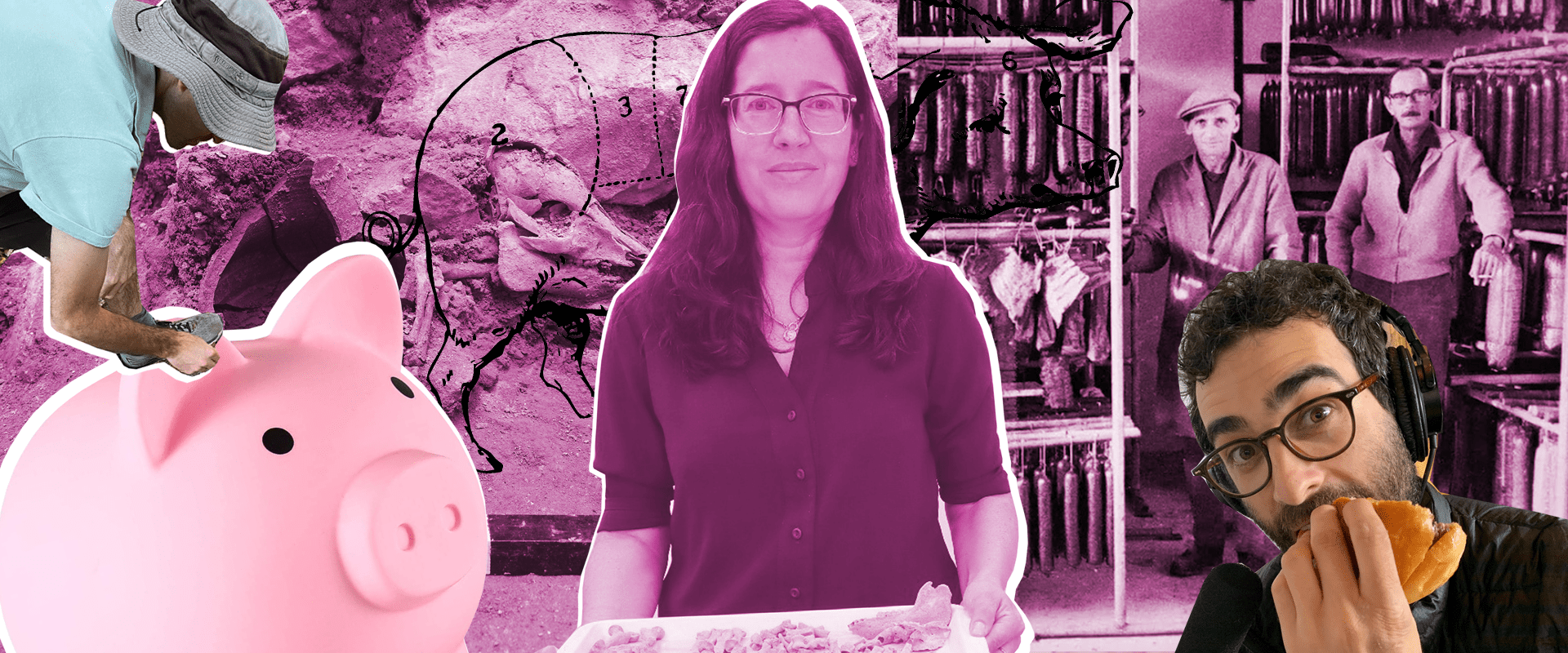Pigging Out
- 1:09:50
- 2021

Not once, but twice, does the Bible admonish us to abstain from eating the flesh of the pig. And though there are many other animals we are commanded to avoid, the pig has – over the centuries – become the quintessential symbol of all that is un-kosher, impure and morally reprehensible. But was that always the case? In an episode that starts in prehistoric times and ends in the 21st century, we explore the place of all kinds of porcine presences – from piggy banks to pork sausages and from wild boars to Iron-Age bones – in Israeli society.
Prologue: Of Their Flesh You Shall Not Eat?
Dr. Lidar Sapir-Hen introduces us to a celebrity piglet, whose discovery – in an 8th century BCE home in Jerusalem – challenges the entire tale we have been telling ourselves for centuries. Could it be that people living right next to Solomon’s Temple, at the time of Isaiah and Amos, ate pork?
Act I: Breaking the Pig
All little Davie wanted was a Bart Simpson doll. But instead, his father bought him a porcelain pig. Etgar Keret’s most widely read short story is about that pig, Margolis, and about true friendship. The short story has entered the Israeli Ministry of Education’s official curriculum, so basically every single Israeli teenager has not only read it, but indeed been quizzed about it. Luckily for you, all you have to do is listen to Juliana Mazzola read it. Or Matias composed and performed the original music in this piece.
Act II: A “Zionist” Pig
Yoshi Fields has spent the greater part of the last year thinking about pigs. He doesn’t eat them (he’s more of a fish-and-very-occasional-chicken-breast kind of flexitarian), but he went up and down the country tracing the history of pork in the Holy Land. Along the way, he learned how – over the decades – pigs have symbolized wildly different things to different Israelis: from a promise of a new and pragmatic Zionism to a threat to our national identity; from an emblem of religious liberty to a prime example of menacing assimilation; from a secular badge of honor to a struggle between socialism and capitalism.
Act III: Where the Wild Things Are
When Marie Röder was eight years old, she survived a terrifying encounter with a wild boar in the depths of Berlin’s dark Tegeler Forst. The frightening experience stayed with her, and – for the next twenty years – boars have regularly appeared in her nightmares. So during the COVID-19 pandemic, as wild boars took over the streets of Haifa, she decided to confront her demons in a DIY form of exposure therapy.
Credits
Zev Levi and Yochai Maital scored and sound-designed the episode, with music from Blue Dot Sessions. Sela Waisblum created the mix. Thanks to our dubbers – David Harman, Asaf Bar Yossef, Ksenia Miliutinskaia and Boaz Dekel – and to Zvi Lederman, Niva Ashkenazi, Michael Vivier, Alicia Vergara, Michael Friedman, Wayne Hoffman, Esther Werdiger, Yuval Cherlow, Jeffrey Yoskowitz, Matan Abrahams, Anne Silber, Haim Oron, Roee Gilron, Sheila Lambert, Erica Frederick, Jeff Feig and Joy Levitt.
The end song, Ze Lo Kaze Muzar Lifgosh Hazir Bar (“It’s Not So Strange to Meet a Wild Boar”), was written and performed by Rock City Haifa.

 Wartime Diaries
Wartime Diaries

